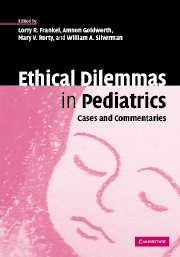Book contents
- Frontmatter
- Contents
- List of contributors
- Preface
- Introduction
- Part I Therapeutic misalliances
- 1.1 Unconventional medicine in the pediatric intensive care unit
- 1.2 Role responsibility in pediatrics: appeasing or transforming parental demands?
- 1.3 Topical discussion
- 2.1 The extremely premature infant at the crossroads
- 2.2 The extremely premature infant at the crossroads: ethical and legal considerations
- 2.3 Topical discussion
- 3.1 Munchausen syndrome by proxy
- 3.2 Some conceptual and ethical issues in Munchausen syndrome by proxy
- 3.3 Topical discussion
- Part II Medical futility
- Part III Life by any means
- Part IV Institutional impediments to ethical action
- References
- Index
3.2 - Some conceptual and ethical issues in Munchausen syndrome by proxy
Published online by Cambridge University Press: 18 August 2009
- Frontmatter
- Contents
- List of contributors
- Preface
- Introduction
- Part I Therapeutic misalliances
- 1.1 Unconventional medicine in the pediatric intensive care unit
- 1.2 Role responsibility in pediatrics: appeasing or transforming parental demands?
- 1.3 Topical discussion
- 2.1 The extremely premature infant at the crossroads
- 2.2 The extremely premature infant at the crossroads: ethical and legal considerations
- 2.3 Topical discussion
- 3.1 Munchausen syndrome by proxy
- 3.2 Some conceptual and ethical issues in Munchausen syndrome by proxy
- 3.3 Topical discussion
- Part II Medical futility
- Part III Life by any means
- Part IV Institutional impediments to ethical action
- References
- Index
Summary
Introduction
Munchausen syndrome by proxy (MSBP) involves someone who is responsible for a patient (often the mother) lying about and possibly even producing his or her symptoms while persistently presenting the patient (most commonly a child) for medical assessment. Doctors are most interested in getting advice on morally permissible means of collecting evidence that MSBP is occurring, as a way to stop harm to the patient. However, there are also other issues of a conceptual nature raised by MSBP such as its relation to child abuse, the distinction between deceiving and harming, and between diagnosis and prevention of harm. In this chapter I will first discuss conceptual issues and then move on to the more clearly ethical concerns related to diagnosis and prevention of harm.
Conceptual issues
The use of the term “syndrome”
Suppose a small percentage of doctors deliberately gave their patients laxatives inappropriately and wrote notes in the patient's record, on which other physicians and nurses in a hospital rely, attesting to the patient's being diarrhetic. Would it be most appropriate to refer to the doctors' behavior as a “syndrome” and think that confirming its occurrence was most appropriately referred to as “diagnosing” the patient's problem? Surely this would be inappropriate language to use, because it medicalizes what is essentially criminal behavior. Similarly, finding out if A was poisoned by B is not best described as diagnosing the cause of A's ill health.
- Type
- Chapter
- Information
- Ethical Dilemmas in PediatricsCases and Commentaries, pp. 67 - 79Publisher: Cambridge University PressPrint publication year: 2005
- 1
- Cited by



